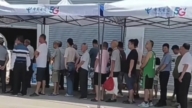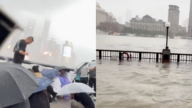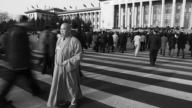【新唐人2011年12月27日讯】今年,面对国内严重的通货膨胀和经济过热,大陆当局不得不收紧银根、将经济发展降速,而欧元区和美国经济的持续低迷,又让中国的出口产业备受打击。对于即将到来的2012年,面临内忧外患的中国经济将往何处去?是否能够实现软着陆?专家和普通民众都非常关注。
因为出口的疲软、原材料等生产成本的上涨,中国大陆的很多中小企业不堪重负,已经倒闭或变相倒闭。而幸存的企业现在又面临年关的困境,需要偿还贷款、发放工资、清还供应商货款。
《美国之音》报导指出,贷款困难、生产成本增加,对大陆中小企业构成很大的冲击,有些恐怕很难熬过这个中国新年。
外需大幅下滑,出口企业困境重重。作为中国经济最主要内需支撑点的房地产业,目前也是一片萧条。
英国《金融时报》中文网报导,大陆的房市降价潮开始从一线城市开始向二、三线城市蔓延,内蒙古鄂尔多斯的房价出现了大约5到7成的下跌,大量商品房无人居住,成为一座“鬼城”。
中国经济现状如此,那么在即将到来的2012年,中国经济到底能不能实现“软着陆”呢?
美国“南卡罗来纳大学”艾肯商学院教授谢田:“很多海内外经济学家都认为,中国经济会实现硬着陆,有可能会出现经济的崩溃、崩盘。因为如果要软着陆的话,有几个要素。一个是要保持适度的经济增长,然后呢,通货膨胀不能够失控,但现在看来,这两点都是很困难的。”
谢田深入分析指出,中共在最近的经济工作会议上确定,2012年的目标是“保增长”,这是中共为降低失业率、维持政权稳定而作出的决定。
谢田:“保持增长的话,它一定要继续加大刺激经济的投入、基础建设的投入,所以呢,很可能几万亿的投入进去以后,我们可以预计,它这个防止通货膨胀的目标实际上是不会实现的。”
谢田强调,通胀除了造成民怨加大之外,还使老百姓的购买力降低,内需市场不振。而欧美等国的经济短期很难复苏,中国出口萎缩的现状无法改善。这样,中国经济将出现滞涨的困境,无法“软着陆”。
“北京天则经济研究所”副所长冯兴元则表示,当局不会让中国经济最大的支撑点——房地产出现崩盘,虽然出口受创,中国经济还是有可能“软着陆”。
冯兴元:“但是我们房地产的需求还是很强劲的,如果这个信贷控制放松的话,房地产这方面的投资还是有很大的空间的。”
“诺贝尔经济学奖”得主保罗•克鲁格曼(Paul Krugman)撰写了一篇评论指出,与上世纪80年代末的日本或者2007年的美国类似,中国大陆当前的景象非常危险:信贷迅速增长﹔经济增长过度依赖高涨的房价,并且出现所有的泡沫化迹象。他认为,中国正在成为世界经济的另一个危险点,有理由担心中国的金融和经济危机会发生。
新唐人记者刘惠、李谦、李月采访报导。
Stagflation or Soft Landing—-Which will it be for China in 2012?
Facing severe domestic inflation and an overheating economy,
the Chinese Communist Party (CCP ) has tightened money supply and decelerated economic growth.
However, continual recession in the eurozone and in the U.S.
has hardly hit China’s export industry.
In 2012, to what situation will China’s economy move forward?
Will it achieve a soft landing? The issues arouse public concerns.
Due to weak exports and soaring production costs,
numerous business failures of small and medium enterprises
have emerged in China.
Surviving companies now face a year-end plight, such as
loan repayment, salary payment, paying off debts to suppliers.
As The Voice of America pointed out, difficult loaning,
increased production costs, all hit China’s small and medium businesses hard.
Some of them might find it difficult to get through the coming
Chinese New Year.
China’s export faces hardship owing to the sharp drop
in external demand.
As the most important driver for domestic demand, China’s
property industry is currently in a recession, too.
According to the UK’s Financial Times Chinese edition reports,
China’s tidal wave of cut housing prices has moved forward
to second-tier and third-tier cities, from first-tier cities.
In Erdos city, Inner Mongolia, housing prices plunged
by 50%-70%, with massive numbers of houses unoccupied. The city has become a “ghost town".
In 2012, will China’s economy achieve a soft landing?
Professor from the University of South Carolina-Aiken, Frank
Tian Xie says, “Many economists in China and overseas
believe that China’s economy will suffer a hard landing,
with the possibility of economic collapse.
To achieve a soft landing needs several factors.
One is that a moderate economic growth should be maintained.
Also that, inflation cannot be out of control.
But now it looks like it will be difficult to pull off both. “
Xie says that recently, the CCP regime clearly set out
its 2012 goal that is, to “maintain growth".
The goal is made in consideration of reducing unemployment
and to maintain its political stability.
Frank Tian Xie says: “To maintain growth needs more economic
stimulus investments on the infrastructure constructions.
We estimate it’s very likely that after throwing trillions in
investments, It’s goal to curb the inflation will fail in reality."
Xie emphasizes that inflation has fueled the public’s
discontentment,
moreover, it has lowered people’s purchasing power,
causing a weak domestic market.
As in the short-term, a recovery is hard to see in Europe
and in the U.S.,
while China’s export decline situation cannot be improved
currently,
thus, China will be caught in the stagflation trap,
and therefore a soft landing will be impossible.
Deputy Director at Beijing-based Uni-rule Institute of
Economics, Feng Xingyuan, thinks that
the CCP regime will not let this happen — the real estate’s
collapse, as the property market has been the largest support point for China’s economy.
Feng says although export is shrinking,
it is still possible to see a “soft landing" ahead for China.
Feng Xingyuan says: “But we still have very strong demand
in real estate.
If they ease credit control, the space in real estate
investment is still very big."
In a commentary, Nobel-Prize winner Paul Krugman points
out that similar to the situation in Japan
at the end of the 1980s or that in the U.S. in 2007,
the current scene in China is very dangerous:
there is rapid growth in credit, economic growth has relied on
a huge construction boom fueled by surging real estate prices, showing all the classic signs of a bubble.
Krugman thinks that China is emerging as another danger spot
in the world economy, there are real reasons to fear financial and economic crisis.
NTD reporters Liu Hui, Li Qian and Li Yue





























